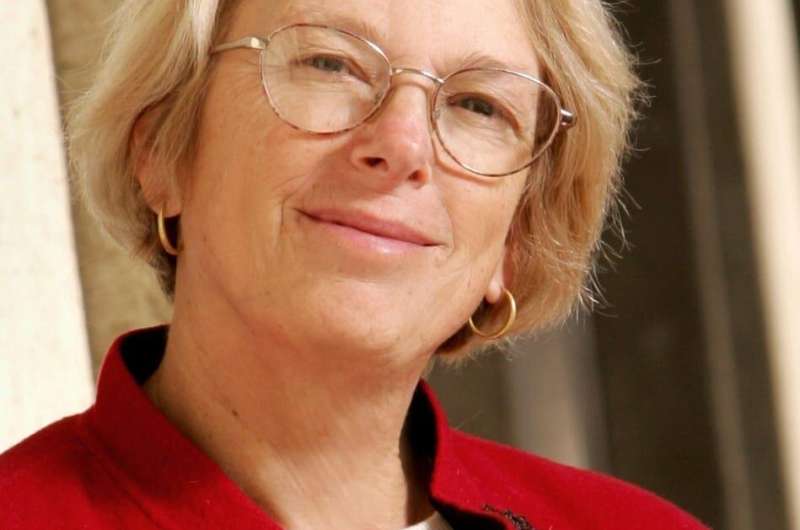Pamela Samuelson is a co-director of the Berkeley Center for Law & Technology and co-facilitator of the university’s public interest technology initiative. Credit: Pamela Samuelson
The U.S. Supreme Court will consider this week whether social media companies are shielded from liability when they use algorithmic systems to recommend relevant content to users.
UC Berkeley experts say this case could be a defining moment for Section 230 of the Communications Decency Act, which generally states technology companies like Google aren't responsible for content others post on their platforms. The oral arguments will preview how large an impact the court's rulings could have.
"Sometimes the Supreme Court decides to make broad statements about how it interprets a particular law and sometimes it focuses on the specific dispute before it," said Pamela Samuelson, co-director of the Berkeley Center for Law & Technology and co-facilitator of the university's public interest technology initiative. "One thing I will be looking for is how broadly or narrowly they are perceiving the question before the court."
Social media platforms have been vectors for wide dissemination of misinformation, harassment and other content that's harmed people and societies. For years, researchers and legislators have explored how to stem the flow of damaging content, while protecting freedom of speech. This case places the nation's top court front and center in that debate.
The court will hear arguments on Feb. 21 in the case known as Gonzalez v. Google LLC, which was filed by family members of a U.S. citizen killed in a 2015 ISIS attack in France.
Making the internet work
The Gonzalez family alleges that Google, through its entity YouTube, violated the Anti-Terrorism Act by materially contributing to elevating terrorists' content. That helped ISIS grow and was a cause of the 2015 attack, the family asserted. They allege that YouTube aided and abetted terrorists by algorithmically recommending ISIS-made content to its users whose viewing history suggested they would be interested in such videos. The plaintiffs say that the recommendations are content created by YouTube, as well as thumbnail images of the videos.
Google has argued that Section 230 protects the company from liability in recommending content to end-users. YouTube's recommender systems are not creating content, said Brandie Nonnecke, CITRIS Policy Lab director and Goldman School of Public Policy associate research professor. They organize the content, display it and help make the internet work, she said.
"It's like going into a library with the Dewey Decimal System. The old card catalog—that's sort of like a recommender system. The books have been organized in a way that helps you find what you're looking for, and it's likely other books you're interested in are nearby on the shelves, just like how a recommender system shares content with you it thinks you're interested in," said Nonnecke. "Without that, it's like going into a library where all of the books are thrown on the ground, and you're like, "Oh, I think maybe the book on art history is over there," but you don't know."
The plaintiffs in the case aren't disputing whether algorithms are necessary for the internet, said Samuelson, a Berkeley law professor. They're drawing a distinction between algorithms, and arguing that YouTube's should not be protected, she said, summarizing the plaintiff's briefs. Nonnecke said differentiating displaying versus recommending content could have a broad chilling effect on free speech.
"We all agree with that if it's illegal content and the [platforms] know it's there, and they're still sharing it and not removing it, that's a problem," said Nonnecke. But drawing a technical line between displaying and recommending content, she said, isn't "going to achieve the goal that Gonzalez wants of stopping the spread of harmful content."
Nonnecke will specifically be listening during the February hearing for any mentions of how a decision could ultimately affect free speech. Meanwhile, Samuelson said she'll be listening to see if the Supreme Court justices draw a similar distinction between types of algorithms.
Samuelson is also interested in whether the justices will share their thoughts about Congress's role in Section 230 debates. Congress has introduced more than 50 bills in recent years to change or repeal the law, though none have passed, she said.
Learn more about these cases and Section 230
- Brandie Nonnecke and Hany Farid in MIT Technology Review: How the Supreme Court ruling on Section 230 could end Reddit as we know it
- Hany Farid in MIT Technology Review: The Supreme Court may overhaul how you live online
- Hany Farid at a Brookings Institution event: Gonzalez v. Google and the fate of Section 230
Provided by University of California - Berkeley
























